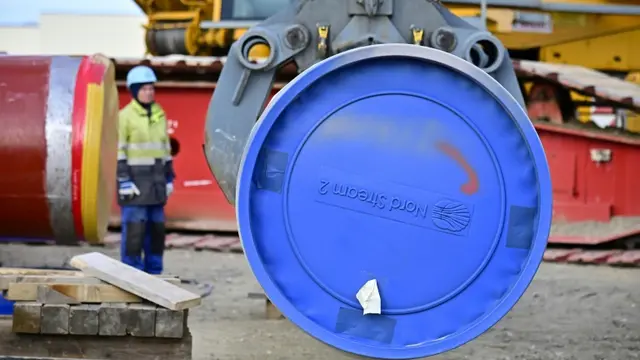Russia on Wednesday vowed to complete construction of a major gas pipeline under the Baltic Sea, despite approval by the U.S. Senate of sanctions that have also angered European states led by Germany.
"We expect that this project will be completed," Kremlin spokesman Dmitry Peskov told reporters, slamming the sanctions as a "flagrant violation of international law."
"Moscow does not like such actions, and neither do the European capitals. Berlin does not like this and neither does Paris," he said, suggesting that sanctions would only lead to higher gas prices for European consumers.
The Nord Stream 2 pipeline between Russia and Germany, a key part of Moscow's export strategy for state energy giant Gazprom, aims to deliver Russian gas to Europe via the Baltic Sea. The 9.5-billion-euro (10.6-billion U.S. dollars) pipeline is set to double shipments of Russian natural gas to Germany.
The sanctions against companies working on the project, which were inserted into Washington's huge annual defense spending bill, easily passed both the U.S. Senate and House of Representatives. The bill now goes to President Donald Trump, who is expected to sign the legislation.
The European Union and Germany have strongly urged the U.S. not to impose sanctions, saying that European energy policy should be decided in Europe.During Wednesday's QA session in parliament, German Chancellor Angela Merkel said Berlin opposed "extraterritorial sanctions" under any scenario and said she saw "no other possibility other than holding talks."
"We haven't backed down [to the U.S.] with regards to the NSA [spying] affair, nor do we intend to back down now."
MEP Manfred Weber, who heads the European People's Party in the European Parliament, said that the U.S. was not behaving correctly on the matter.
"You can't undertake sanctions against a friend and a partner and hold business as a hostage," he told the Funke Media Group, adding that Germany had to work in coordination with its European partners.
The bill would impose wide-ranging sanctions on Russia for interference efforts, including sanctioning Russian banks that support Russian efforts to undermine foreign democratic institutions, and sanctioning relatives and associates of Russian President Vladimir Putin who solicit "illicit and corrupt activities" on behalf of Putin. In addition, the bill would sanction both Russia's cyber industry and target its sovereign debt. Another major contractor that could be hit by the sanctions is Swiss-based pipeline laying company Allseas, which has been hired by Gazprom to build the offshore section.
The Nord Stream 2 pipeline between Russia and Germany aims to deliver Russian gas to Europe via the Baltic Sea. /AFP Photo
Russia had hoped to launch the pipeline, which is 80 percent finished, in late 2019 but the completion has been delayed by difficulties in obtaining permits from Denmark.
Russian officials have said they expect the pipeline to become operational in 2020.
The 1,230-kilometer Nordstream 2 pipeline will expand the existing Nord Stream 1 project linking Russia to Germany whose lines were inaugurated in 2011 and 2012.
The pipeline is viewed with suspicion not only by the U.S., but also by Ukraine, Poland and the three Baltic States. Ukraine, the traditional hub for the transit of Russian gas to Europe, risks losing out on significant transit fees.
A spokesman for Nord Stream 2 said the consortium was "aware of the ongoing legislative procedure in the U.S. and the political debates" but added "We cannot comment on any implications for our project."
Half of the project is financed by Gazprom, with the rest covered by its European partners – Germany's Wintershall and Uniper, Anglo-Dutch Shell, France's Engie and Austria's OMV.
(CGTN)
 简体中文
简体中文

